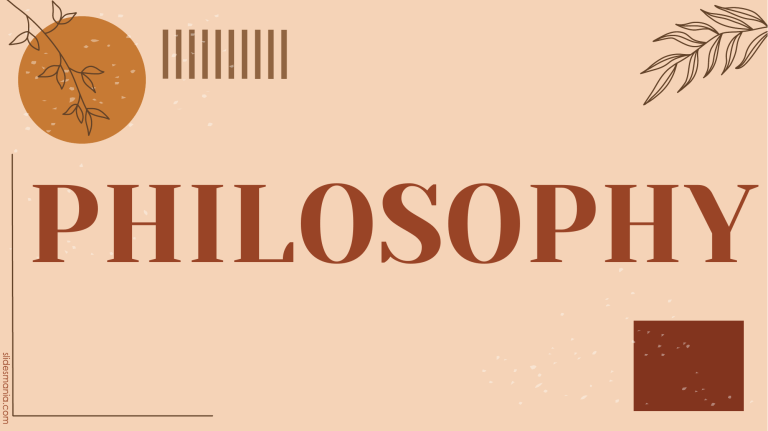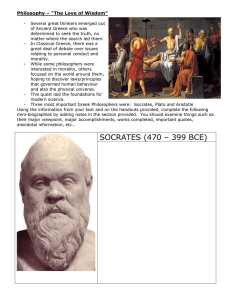
PHILOSOPHY This is our group. Freya Niña Rica V. Devila - 16 yrs. Old - Single - Cotcoton, Sta. Filomena, Alegria, Cebu Marian Syed M. Legarde - 16 yrs. Old - In a relationship - Tapon, Sta. Filomena, Alegria, Cebu Luke Aller -17 yrs. Old - Single Dad - Bulacao, Sta.Filomena, Alegria, Cebu Hello! I’m... FREYA NIÑA RICA VILLARBA DEVILA YOU’RE REPORTER FOR THIS TOPIC! TABLE OF CONTENTS 01 | What is philosophy. 02 | Most notable ancient Greeks 03 | Why is there a need to philosophize. 04 | How do we 06 | Reflection & 05 | Holistic thinking characterize the Practical uses of study of philosophy. and Partial thinking philosophy in our lives We will also talk about this. And we will talk about this last. What is Philosophy? ● “Knowing Yourself is the Beginning of all Wisdom”. - Aristotle Did you know? ● ● ● ● ● ● "Philosophy" from Greek words: philos (love) and Sophia (wisdom) Ancient Greeks: "love of wisdom“ Study using human reason to investigate ultimate causes and principles Philosophers are "lovers of wisdom“ Pioneers in history, biology, medicine, mathematics, astronomy, physics, and more. Many ancient philosophers were considered experts in various fields. Most notable ancient Greeks philosophers. ● “No man is free who cannot control himself”. - Pythagoras GUESS ME? PYTHAGORAS HERACLITUS DEMOCRITUS DIOGENES OF SINOPE EPICURUS GUESS ME? SOCRATES PLATO ARISTOTLE PYTHAGORAS (570 BCE TO 495 BCE) ● Mathematician and scientist ● Formulated the Pythagorean theorem ● Attracted followers and established a community for religion and philosophy studies HERACLITUS (535 BCE to 475 BCE) ● Proposed existence based on a higher plan called "logos“ ● Believed in the permanence of change ● Famous quote: "No man ever steps in the same river twice" DEMOCRITUS (460 BCE to 370 BCE) ● Devoted to studying natural phenomena causes ● Proposed matter made of atoms DIOGENES OF SINOPE (412 BCE to 323 BCE) ● Advocate of simple and virtuous life ● Emphasized showing virtue through words and actions ● Lived extremely austere life, like a beggar ● Critic of philosophers like Plato and Aristotle ● Influence on Cynicism and Stoicism philosophies EPICURUS (341 BCE to 270 BCE) ● Believed philosophy leads to a happy life ● Gave rise to Epicureanism ● Epicureanism promotes wisdom and simple living for a fear-free, pain-free life SOCRATES (470 BCE to 399 BCE) ● Foremost philosopher of ancient times ● Significant contributions to ethics ● Critic of intellectuals, considered himself a "midwife" of wisdom ● Believed philosophy could lead to a virtuous life ● Formulated the Socratic Method for examining topics through questioning PLATO (427 BCE to 347 BCE) •Student of Socrates •Wrote down Socrates' teachings and added his own ideas •Foundation of Western philosophy •Theory of Forms: Everything based on eternal, unchanging ideas in the mind •Focus on ideal society and government ruled by wisdom and reason •Developed dialectic, a method of inquiry •Founded the Academy, the first Western institution of higher learning ARISTOTLE (384 BCE to 322 BCE) ● Attended the Academy, prominent student of Plato ● Disagreed with Plato's theory of forms ● Emphasized perception and senses for understanding reality ● Influential in physical sciences ● Worked in various disciplines: zoology, psychology, ethics, politics ● Developed a classification system for plants and animals ● Pioneered deductive reasoning through logic studies Ancient Greek philosophy laid the foundation for both Western and Eastern philosophies, but they developed differently over time. Western philosophy became more systematic and specialized, while Eastern philosophy remained fluid, emphasizing social relations, family, and community. Today, philosophy is a vital field of study, influencing various areas of human knowledge and inquiry, from arts to science and technology.





